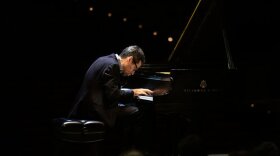By Elizabeth KramerListen NowA new documentary about the formative years of the Louisville Orchestra premieres tomorrow at the Baxter Avenue Theatres. But the organization is looking now to make itself relevant in a world where classical music is often an afterthought.The documentary Music Makes a City recounts how in 1937 a politician named Charles Farnsley and conductor Robert Whitney founded the Louisville Orchestra, then launched this semi-professional group into the worldwide limelight. As the film explains, that fame came during the 1950s after Whitney had some interesting ideas."He drew up a detailed plan of growth with an exacting timetable of goals," the film's narrator, Will Oldham says, "and presented it to the symphony board. The board agreed to all of Whitney’s ideas."
The ideas including inviting composers to create new work for the orchestra to perform at world premieres and record on LPs that were distributed by subscription. Participating composers included Elliott Carter, Aaron Copland and William Schuman. And along with Schuman the orchestra commissioned Martha Graham so the two worked together to create new music with original choreography for a Louisville performance.But in recent decades, financial instability has overshadowed the international accolades the orchestra once received. In 2006, the orchestra leaders declared the institution on the verge of bankruptcy and musicians were threatening to strike. But the orchestra worked through that with the administration pledging to stabilize the organization by raising $15 million and the musicians agreeing to a pay cut over the next five years.In dire times, the message the orchestra sent to the community was — "We need money."That’s Robert Birman, the orchestra’s current chief executive officer.These days the orchestra’s budget is in the black and Birman is looking to the future and working to help the orchestra — and the community — thrive with music.Over the past six months, he and a few members of the orchestra have worked to develop a vision to make the orchestra into a musical resource for the community and spur demand for orchestral music. Birman says it’s an important step, especially given that only 3 percent of the local population buys tickets and participates in the orchestra’s educational programs."Fewer and fewer people are learning and having exposure to live music," Birman says, "so if the orchestra doesn’t help as an antidote to that future demographics and audience projections could look pretty dire."The vision to change that includes serving local music teachers, offering private teaching studios, instituting an instrument loan program, giving music appreciation classes, and creating a resource center with a library. And all this would feed into nurturing audiences for performances. Birman says no details are set, but one idea is to have all these services in a building called the Louisville Orchestra Symphony Center."This is a space where," Birman says, "regardless of your age or your station in life, you can walk through the doors, you’re greeted by a concierge and you’re asked one simple question — 'What can we do for you?'"In recent weeks, Birman has been incorporating ideas from others with whom he’s shared this vision — from musicians to potential partner groups, like schools. And in the coming year, he plans neighborhood forums throughout the region to get new ideas and hone existing ones.Drew McManus consults symphonies nationwide and has a blog dedicated to issues about the orchestra business. He says the ideas percolating in Louisville are the most novel he’s seen."A lot of groups still jump into things that might seem like really good ideas," McManus says, "without really having planned out what they want to get from it."McManus says these ideas give hope to a future where orchestras can flourish, something that’s needed now as orchestras nationwide are struggling to survive. He says the vision even has the potential to change how the public thinks about an orchestra and builds a solid business model."Ultimately, I think you do have to look at music — classical music — as any other type of business where you have to out and build your audience; you have to create market," he says.Birman says he’s on board with that idea as well. And this month, he’s taking this vision to New York when the orchestra and the producers of the documentary about its history meet with some national foundations.





